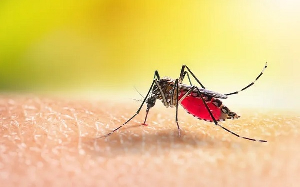The District Chief Executives (DCEs) of four assemblies in the Eastern Region have called on the Ghana Health Service (GHS) to help curb an invasion of a new breed of mosquitoes which are causing illness in their areas.
According to the DCEs of the Akyeamansa, Achiasi, Birim South, and Birim Central Districts, the mosquitoes, typically found in cocoa farms, were large, black, and have some whitish markings.
In separate interviews with The Ghanaian Times on Monday, they said malaria cases were increasing at the various health facilities and a lasting solution should be found to prevent loss of lives.
The Achiase DCE, Richmond Amponsah Agyabeng said “The situation has become a significant health threat in the region, with numerous health centres reporting cases related to these mosquito bites.
“Approximately, 300 people across the four districts have been hospitalized, though some, including himself, have since been treated and discharged”, he said.
Mr Agyabeng said a National Community Health Planning and Services (CHPS) compound in the Achiase District alone had recorded about 30 cases so far and emphasised and stated the need for immediate intervention.
He said the situation in his district started a month ago, but residents self-medicated until the assembly realised that the situation was much more complex than it was imagined.
Similarly, the DCE for Birim South District, Asare Danso confirmed that his district had recorded numerous cases and called on the GHS to help find a lasting solution to the issue.
The situation was same in the two other districts.
When contacted, the Eastern Regional Deputy Director of Public Health, Dr. John Ekow Otoo confirmed that his department has received official reports from the affected districts.
He revealed that in response, a team of health officials from both the district and headquarters levels of the GHS has been dispatched to investigate the matter.
"The findings from this investigation will be communicated once the investigation is completed,” he said.
The invasion of mosquitoes in the districts comes two weeks after the GHS announced that the country was making progress in the reduction of malaria cases and deaths.
At a recent malaria training programme for journalists in Accra, the Director of Public Health of the GHS, Dr Franklin Asiedu-Bekoe, said Malaria-related deaths have reduced drastically from 2,799 in 2012 to 146 lives last year.
He said the testing rate had improved from 38 per cent in 2012 to 98 per cent in 2023 while prevalence had decreased from 27 per cent in 2011 to 8.6 in 2022, and deaths due to malaria have also decreased significantly.
However, he said malaria was still a public health threat in the country and it will stop at nothing to achieve a zero rate of mortality by 2028.
Health News of Saturday, 13 July 2024
Source: ghanaiantimes.com.gh

















